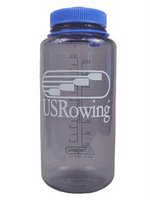
Hydration in Rowing Part I
This will be a multi-part posting over the next few days:
Part I. General (but for many new!) Information and Recommendations
Part II. What to drink!
What is there to add about hydration? If there is one topic that coaches and athletes think that they have a good grasp of scientifically, it is probably hydration. How hard is it?
So what do people agree on?
- Athletes sweat - a lot - even in cold weather.
- Even a small loss in body mass due to fluid loss can affect performance significantly.
- Athletes need to drink while training.
- The body does not tell you it is thirsty soon enough – you need to drink before you feel thirsty.
And if you feel very scientific you might even weigh yourself before and after training, knowing that ever 1 kg loss in mass represents 1 L of fluids that have been lost.
On top of this of course is the lightweight component in rowing. Lots of lighties sweat down to weight - and the fluid loss can affect performance.
Is that it? Well if you are this much on top of things you are probably ahead of lots of others. But there is more that has come out recently that is worth noting. The special situation in rowing - athletes are in relatively small boats a long way from (drinking) water of course also affect how you approach hydration.
More information for you:
An excellent source of information is the Australian Institute of Sport (AIS). They put a lot of money into supporting their athletes and produce a good deal of information that is freely available on the web.
One such report about hydration and rowing gives us an indication of exactly how much fluid is lost rowing. It presents somewhat technical information from their studies, but it all boils down to this:
Even in cold weather (well, for Australia) the athletes studied only replaced half of the fluids lost to sweat. And these were elite athlete who (presumably) are knowledgeable about such things. I would venture that the average junior or recreational adult is losing even more.
The AIS rowers lost 1.5 L per hour in warm weather and 0.75 L per hour in cool weather.
Recommendations - not rocket science, but well worth considering:
- Rowers don't drink enough while training!
- Schedule enough breaks in your sessions to drink.
- One water bottle is not enough - even a one hour session is likely to result in a loss of fluids equivalent to more than a one liter bottle of water.
- Carry an extra bottle in the coaching launch for each athlete in warm weather!
- Have a fluid replacement strategy after practice to ensure that fluids are replaced quickly.
- Lightweights - a loss of weight during a training session is NOT a good sign.
What are your thoughts? Post a comment by clicking the link below.
Stay tuned for Part II. What should a rower be drinking?
